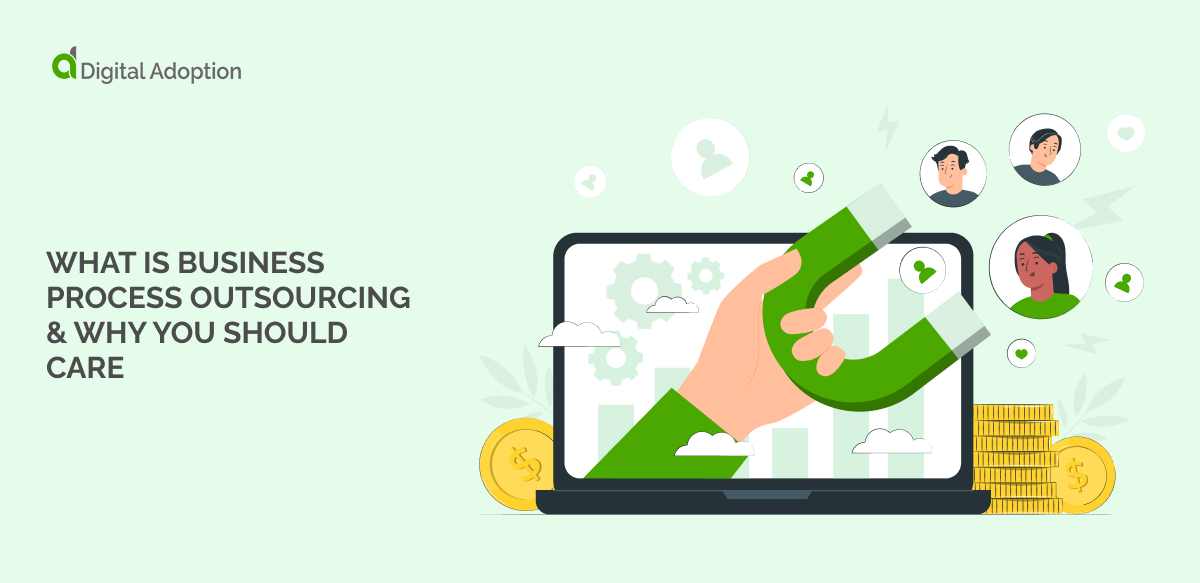Business Process Outsourcing (BPO) is a strategic approach that allows businesses to delegate a range of business functions to third-party partners and vendors who can provide specialized expertise and resources.
With the need to compete in today’s globalized business climate, companies are under constant pressure to deliver results while minimizing costs. BPO can be beneficial because it provides access to cutting-edge, on-demand services to help businesses achieve this balance.
Today’s top BPO providers offer various services, including human resources, accounting and finance, customer service, IT helpdesk and technical support, and supply chain management (SCM).
Outsourcing business processes allows companies to accelerate their digital transformation journey and achieve two to three times more impact than under traditional models. It can also help companies leverage various technologies, such as artificial intelligence (AI) automation and the Internet of Things, to increase efficiency and drive innovation.
But what exactly is this $90 billion industry? And how can it have a positive impact on digital transformation?
This article will cover the basics of Business Process Outsourcing (BPO), including its definition and how it works.
We will also discuss its benefits, such as cost savings and increased efficiency, its challenges, such as data security and quality issues, and provide final thoughts on the future of BPO services.
Table of contents:
- What is Business Process Outsourcing
- How Business Process Outsourcing Works?
- What are the Benefits of Business Process Outsourcing?
- What are the Challenges of Business Process Outsourcing?
- The Future of BPO Services
- BPO FAQs
What is Business Process Outsourcing (BPO)?
Business Process Outsourcing (BPO) refers to the practice of contracting out specific business functions or processes to third-party service providers who possess specialized expertise and resources to carry out these tasks.
It is a strategic approach that enables businesses to focus on their core competencies while efficiently managing non-core functions through outsourcing, resulting in greater efficiency, reduced costs, and expertise from specialist BPO companies.
A BPO provider oversees non-core activities, allowing companies to focus their resources on their core activities and explore new technology trends like cloud computing and artificial intelligence.
BPO enables companies to focus on what they do best.
Research shows the BPO market reached $7.8 billion in 2021, with Europe (EMEA) accounting for about one-third ($2.6 billion) of the global market.
The uptake of BPO has increased over time, but events like the COVID-19 pandemic have certainly sped up the adoption process.
Due to COVID-19, major vendors in the BPO market, such as Accenture and Infosys Limited, report that over 80-90% of their employees worked remotely in 2020.
Why Is BPO Important?
Business Process Outsourcing plays a crucial role in today’s global economy.
The latest data from Statista shows the business process outsourcing market is expected to grow at an annual rate of 4.68%, with revenue projected to reach US$0.35tn in 2023 and US$0.44tn by 2028.
BPO offers cost efficiency by saving on overhead costs like infrastructure and salaries—enabling companies to focus on core competencies while leveraging the specialized expertise of outsourcing providers.
BPO also enables rapid scaling without significant investments. It enhances flexibility, allowing businesses to adapt to changing market conditions.
By delegating non-core functions, organizations can concentrate on pursuing strategic initiatives that drive innovation.
BPO also provides a competitive advantage through access to global talent pools and diverse perspectives.
Tapping into diverse talent from different regions and cultures enables BPO companies to gain valuable insights and fresh ideas—fostering innovation and creativity within their operations.
Overall, BPO offers numerous advantages for businesses, including cost savings, operational efficiencies, improved customer experience, agility, collaboration, and ample growth potential.
How Business Process Outsourcing Works?
Business Process Outsourcing (BPO) takes various forms, such as Information Technology Enabled Services (ITES), Legal Process Outsourcing (LPO), and Knowledge Process Outsourcing (KPO).
It can be overwhelming with so many sub-types and acronyms; hence, we’ve simplified it into two overarching supertypes – back-office BPO and front-office BPO.
- Back Office BPO
Back Office BPO is outsourcing non-customer-facing business operations to a third-party service provider. This helps businesses streamline internal functions, reduce costs, and focus on core competencies like customer service and product development.
Back-office Business Process Outsourcing (BPO) involves outsourcing non-customer-facing activities such as:
- Human resources
- Administrative duties
- Finance and Accounting
- Extensive research and analysis functions (like data analytics)
- IT Infrastructure
- Legal research
- Quality assurance
- Payment processing
- Front Office BPO
Front Office BPO is outsourcing customer-facing operations such as customer service, technical support, sales, and marketing to a third party. Its goal is to improve customer experience, revenue, and efficiency while allowing businesses to focus on core competencies.
Front-office business-related operations that are frequently outsourced include:
- Customer relations
- Digital Marketing
- Sales
- Tech support
The main difference between these two types of BPO is that back-office services are typically more cost-effective. In contrast, front-office activities require a greater level of expertise to maintain quality.
According to a Deloitte survey, 52% of executives reported outsourcing business functions to service providers, while 48% indicated handling these functions in-house.
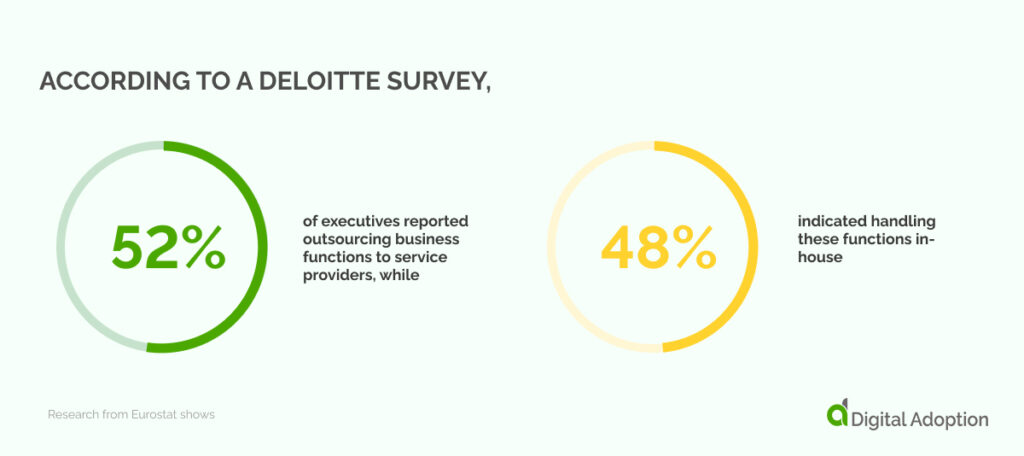
It’s also worth knowing the differences between onshore outsourcing (also known as domestic outsourcing), nearshore outsourcing, and offshore outsourcing. These refer to whether your outsourcing company is in the same country as you, a bordering country, or a country further away (respectively).
For example, in 2016, Google outsourced development and customer support functions to India, following the lead of Apple. Meta began outsourcing content moderation functions to the Philippines a few years later.
Though it’s growing in popularity, BPO has been a popular tactic among some of the biggest corporations in the world for many years—saving American companies between 70% to 90% in labor costs.
What are the Benefits of Business Process Outsourcing?
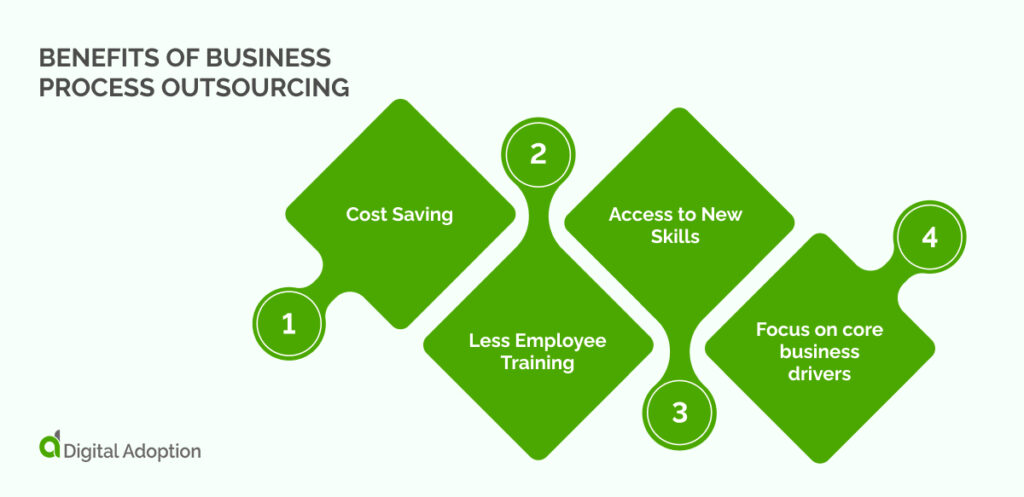
Businesses that have adopted Business Process Outsourcing see significant increases in process automation, one of the most impactful and popular forms of digital transformation.
This, in turn, allows businesses to drive better customer experience, reduce costs, and create an agile business model with relatively little internal effort.
BPO drives digital transformation in many ways, including:
- Cost Saving
One of the biggest challenges of any digital transformation initiative is the time-to-value of new technologies.
New digital transformation initiatives are often costly and can take time to realize their value. Outsourcing a process reduces the time-to-value compared to trying to overhaul the process internally.
Offshore outsourcing is especially useful in reducing the costs of non-core processes. Companies will often make use of this strategy during global expansion efforts.
- Less Employee Training
Businesses can outsource their processes to specialized providers with access to the latest technologies and expertise.
This means you don’t need human resources to spend time and money on employee training programs; instead, you can rely on your BPO service provider to use the most up-to-date technology.
- Access to New Skills
With digital transformation initiatives, you’ll often find that you require a specific skill for a specific amount of time.
Businesses have two options: hire someone with a particular skill or train someone internally.
Both of these are timely and costly for human resources. The BPO industry presents another option. Concrete skill sets are more efficiently utilized in a BPO Provider with multiple clients. By outsourcing, you gain access to new and innovative services.
- Focus on core business drivers
Outsourcing to a third-party vendor allows you to focus your resources on core business operations and key objectives that drive growth, like digital marketing, product development, and strategy.
The correct choice for outsourcing services depends heavily on your business’s strengths and weaknesses.
With BPO, you can dedicate more of your attention and effort towards these areas without being distracted by non-core activities such as data entry or payroll management.
What are the Challenges of Business Process Outsourcing?
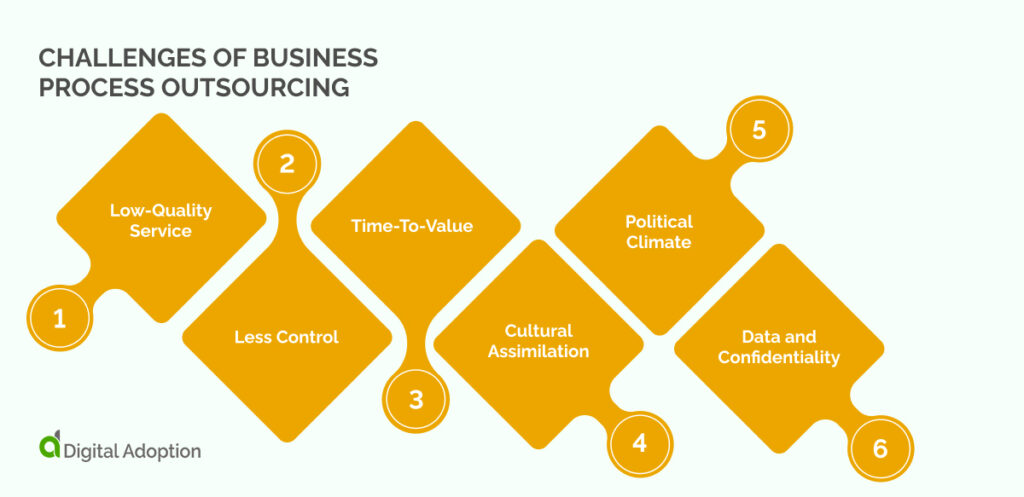
We’ve covered the benefits, but Business Process Outsourcing is not without its challenges.
If you’re considering outsourcing, you should be aware of some critical issues that may arise when implementing a BPO strategy.
- Low-Quality Service
One of the most significant risks with Business Process Outsourcing is poor quality service delivery from your BPO provider.
Business processes are often complex and require expertise to execute efficiently and accurately. If you don’t do your due diligence in selecting a reputable provider with proven experience in the outsourcing process, it could result in substandard output.
- Less Control
When you outsource a business process, you relinquish control over how that process is managed and executed.
This could lead to a lack of visibility into the process and its results.
Too much control over a process can make it difficult for your service provider to do their job. Too little, and you could lose sight of growing issues.
- Time-To-Value
It takes time to realize the business value of outsourcing.
Businesses may run into issues such as lengthy onboarding processes, lack of integration with existing systems, or poor communication between provider and client.
This can delay realizing any cost savings or efficiency gains anticipated upon signing the BPO contract.
- Cultural Assimilation
Organizational culture is vital in how effective Business Process Outsourcing is for your business.
Countries have different cultures and laws around labor, which could result in a clash of corporate values between client and provider if not managed properly upfront.
According to Deloitte, the negative impact on company culture is a top third-party selection worry for 22% of executives.
As a side note, you must also consider the feelings of your existing employees who may have processes and responsibilities taken away from them.
- Political Climate
The geopolitical climate can also have an impact on Business Process Outsourcing.
You should be prepared for the potential risks of outsourcing to a foreign country, such as currency fluctuations, export/import restrictions, or political instability.
Businesses should constantly monitor the political climate in the countries they outsource to and adjust their strategies as necessary.
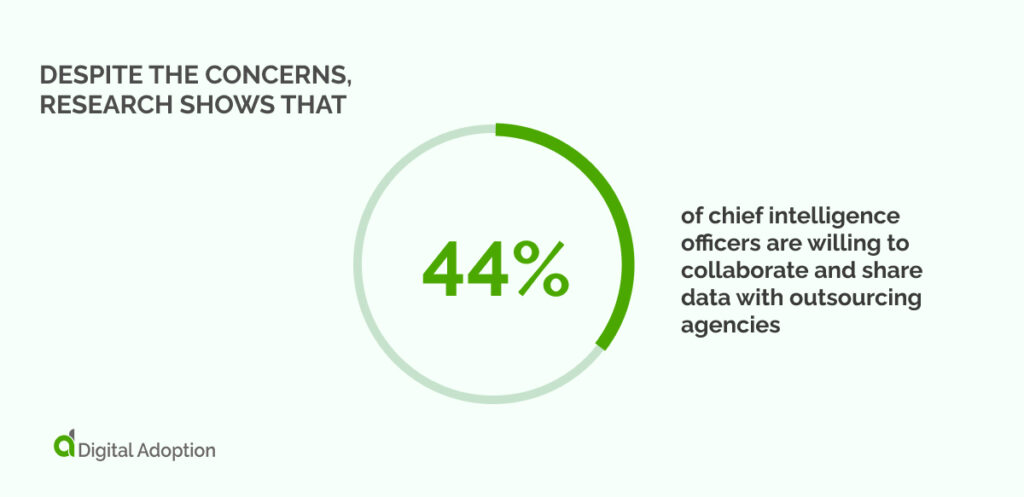
Despite the concerns, research shows that 44% of chief intelligence officers are willing to collaborate and share data with outsourcing agencies.
6. Data and Confidentiality
Data and confidentiality concerns are significant sources of friction for businesses considering BPO.
Giving a completely different company you don’t know access to all your sensitive data can be disconcerting.
It is important to take certain measures to ensure your data is secure during a Business Process Outsourcing arrangement, such as implementing secure data transfer protocols and ensuring contractual agreements include provisions for data protection and confidentiality.
The Future of BPO Services
Business Process Outsourcing can be a powerful tool for businesses looking to drive digital transformation.
The growth of the BPO market in recent years proves it.
In the future, Business Process Outsourcing will only become more popular as businesses embrace cloud computing and other digital transformation trends.
Organizations outsource processes so they can focus on core business functions while relying on BPO providers to keep up with the latest technology trends.
Referring back to Deloitte’s outsourcing survey, it’s thought that the future of BPO will be focused on:
- Building analytics and reporting capabilities to drive higher value.
- Better customer experience, user-centric design, and self-service capabilities.
- Achieving further savings through Robotic Process Automation (RPA).
- Shifting workplace and workforce strategies to more hybrid delivery models, developing remote work strategies, and leveraging location-agnostic hiring.
Business Process Outsourcing is an increasingly popular choice for businesses looking to drive digital transformation initiatives, and it’s easy to see why.
Following the advice, we’ve shared an excellent starting point. You should now be ready to research process outsourcing solutions for your own business.
Business Process Outsourcing FAQs
Q: What types of companies benefit most from BPO?
A: Companies that benefit most from BPO require high-volume and repetitive tasks, such as data entry or customer service, which a third-party service provider with specialized skills and expertise can perform.
Q: How do I select the right BPO service provider for my business?
A: When selecting a BPO service provider, it is important to consider factors such as their experience and track record in providing similar services, their pricing structure, their ability to meet your specific needs and requirements, and their reputation and level of customer service.
Q: What should I include in a BPO contract?
A: A BPO contract should include provisions that address issues such as data security, confidentiality, performance metrics, termination and renewal, dispute resolution, and liability. It is also important to clearly define the scope of services to be provided and the roles and responsibilities of both parties.
Q: Can BPO help my business reduce costs?
A: One of the primary benefits of outsourcing through BPO is cost savings. By delegating certain functions to a third-party service provider, businesses can avoid the expenses associated with hiring and training new employees or investing in new infrastructure or technology.

